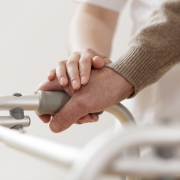MS Awareness in Assisted Living Facilities
Multiple Sclerosis (MS) is a chronic condition that impacts the brain and central nervous system, particularly affecting senior adults. For those living with MS, managing symptoms can be increasingly challenging, especially as worsening symptoms may lead to disability over time. Raising awareness about MS is essential to ensure individuals receive specialized care and support. Assisted living facilities provide staff and families with the best care, resources, and education. By fostering a deeper understanding of the unique challenges faced by residents with MS, they can create a more compassionate and supportive environment for those living with this condition.
Challenges of MS in Assisted Living Facilities
Living with MS presents unique challenges that significantly impact the lives of those affected. Mobility, rehabilitation, and medical management are common issues when dealing with MS. Mobility challenges, such as fatigue, numbness, weakness, and imbalance, can disrupt daily living for residents with MS. Tasks like walking, completing daily activities, and transferring may become difficult, often necessitating assistive devices and MS-friendly amenities such as wide hallways, grab bars, well-lit corridors, and accessible accommodations.
Persistent fatigue can limit residents’ ability to perform daily activities, leading to feelings of despair and isolation. Assisted living staff and caregivers must be well-trained and knowledgeable about MS to provide personalized care and implement energy conservation strategies for effective fatigue management. With proper planning and techniques, residents can adapt activities, maintain independence, and enhance their quality of life.
Medical management is critical due to MS’s complexity. Accurate medication administration, monitoring for side effects, and clear procedures for emergencies and relapses are essential. Highly trained staff and caregivers, equipped with regular assessments and ongoing training, are vital to addressing emergencies and complications. By meeting these needs, facilities can better support residents with MS, ensuring their evolving challenges are met with compassion and expertise.
Care Strategies for MS Patients
Caring for individuals with multiple sclerosis (MS) requires specialized skills and knowledge to address the disease’s complex and varied challenges. Effective MS management involves a multifaceted approach aimed at slowing disease progression, alleviating symptoms, and improving overall quality of life. Key strategies include therapies, rehabilitation, and support systems tailored to each patient’s unique needs.
Medications, such as oral medications, injectables, and infusions, help slow disease progression and reduce relapse frequency. The choice of medication depends on the type and severity of MS and the patient’s overall health. Symptom-specific treatments, like baclofen for muscle spasticity or modafinil for fatigue, are also essential. Additionally, antidepressants or anti-anxiety medications may be prescribed to address mood disorders, which are common among MS patients.
Complementary therapies include acupuncture, yoga, massage, and mindfulness practices. They are increasingly integrated into MS care strategies. These approaches help reduce stress, promote relaxation, and enhance overall well-being, providing patients comfort.
Rehabilitation is another critical component of MS care. Physical therapy focuses on improving strength, balance, and coordination. In contrast, occupational therapy helps patients adapt daily activities to maintain independence and safety. Speech therapy addresses communication and swallowing difficulties, and regular physical activities like swimming or low-impact aerobics improve mobility and mental health. Healthcare professionals should guide all rehabilitation efforts to ensure safety and effectiveness.
Support groups are invaluable for MS patients and their families. These groups offer a safe space for sharing experiences, seeking advice, and finding encouragement. They help alleviate feelings of isolation, anxiety, and depression, fostering emotional resilience. Family and caregiver support is equally essential, as MS impacts the patient and their loved ones.
MS patients can better manage their symptoms, maintain independence, and preserve their dignity by combining these strategies- targeted therapies, personalized rehabilitation, and robust support systems. A holistic and proactive approach empowers individuals to navigate the challenges of MS while enhancing their quality of life.
Connecting with MS Resources in Assisted Living Facilities
Individuals navigating the complexities of multiple sclerosis (MS) are far from isolated. A wealth of resources exists to guide them, connecting them with expert medical professionals, vibrant online communities, and supportive peer groups.
Local and national MS organizations stand as pillars of support, providing access to vital educational materials that address the multifaceted challenges of living with MS. Whether through online platforms or in-person gatherings, these communities offer invaluable opportunities for socialization, fostering new friendships, and connecting with fellow MS patients.
Patients gain access to practical, real-world advice and coping strategies gleaned from lived experience, receive informed recommendations from healthcare providers and stay abreast of the latest treatment options. This support network empowers individuals to actively manage their condition and navigate their journey more confidently and resiliently.
Looking for specialized care in Nebraska? Click here to learn all about Rihcmont Senior Living!
Richmont Senior Living is proud to serve Ashland, NE and the surrounding cities: Memphis, Springfield, South Bend, Greenwood, Murdock, Waverly, Murdock, Ithaca, and Chalco




